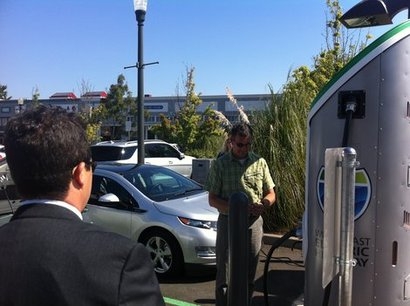
Signatories include General Motors, Honda, Proterra, Exelon, NationalGrid, PG&E, Siemens, Consumer Federation of America, Ceres, Forth, Natural Resources Defense Council (NRDC), Plug In America, Sierra Club and many more. By signing the accord, these organisations are committing to support the evolution of electric mobility and the development of programmes to accelerate it – all while stimulating innovation and competition in the marketplace.
Regardless of policy uncertainty at the state and federal level, the Accord outlines how transportation electrification can be advanced by policymakers, public utility commissions and local and state governments in a manner that benefits utility customers and all forms of transportation.
“We envision a world with zero emissions” said Britta Gross, director, General Motors Advanced Vehicle Commercialisation Policy. “That’s the future and the Accord lays out the essential building blocks for a compelling energy infrastructure that we can all rely on for decades to come. Innovations in transportation electrification will benefit society as a whole – and cross-industry, multi-stakeholder cooperation is key.”
Christopher Budzynski, director of utility strategy, Exelon Utilities, added that it is clear that the future of transportation will be electric and that the Accord provides a baseline from which utility regulators can support growing demand for affordable electrified transport. Exelon’s signature is a promise to meet that demand through greater grid efficiency and reduced air pollution in a way that benefits all communities.
The Transportation Electrification Accord (the ‘Accord’) is aimed at organisations for use in policy design, education and outreach. It outlines how transportation electrification can be advanced in a manner that benefits all utility customers and users of all forms of transportation, while supporting the evolution of a cleaner grid and stimulating innovation and competition for US companies.
The Accord’s guiding principles affirms that there is a clear case for electrifying transportation, which can provide benefits to all consumers (including the socioeconomically disadvantaged), advance economic development, create jobs, provide grid services, integrate more renewable energy, and cut air pollution and greenhouse gases. Electrified transportation should include not only passenger cars, but also larger vehicles such as transit buses and delivery trucks, as well as off-road equipment such as airport and port electrification equipment.
A critical part of the acceleration towards an appropriate deployment of electric vehicle charging infrastructure based on market penetration projections along highway corridors, as well as throughout local cities and towns. Electric transportation needs to be supported at the state and local government levels and the Accord states that adoption of open charging standards or protocols for both front-end and back-end interoperability is vital to drive innovation and foster competition. An open system also promotes greater transparency of vital data and information, which can be shared with a variety of innovative companies. The guidelines developed by the Open Charge Alliance (OCA) should be used as the baseline. Data developed by third parties from behind-the-meter devices should also be made available to utilities for use in planning system architecture and EVSE.
For additional information:

